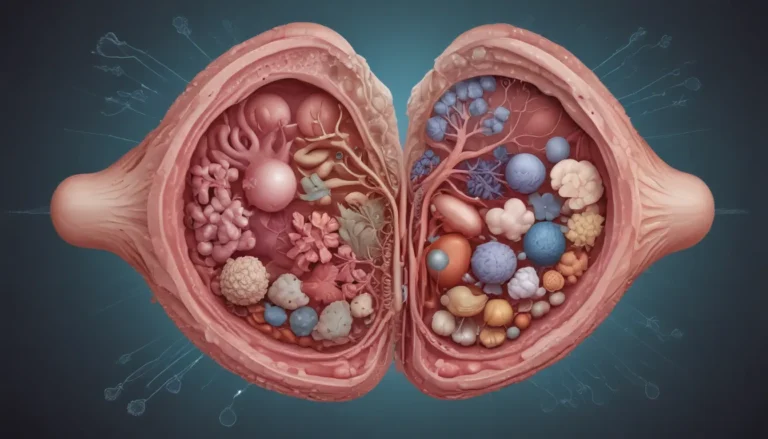A Note About Images: The images used in our articles are for illustration purposes only and may not exactly match the content. They are meant to engage readers, but the text should be relied upon for accurate information.
Cell fate determination is a captivating process that governs the development and specialization of cells in all living organisms. From the intricate signaling pathways to the environmental cues that influence cellular decisions, understanding cell fate determination provides invaluable insights into the formation and maintenance of tissues and organs. In this article, we will delve into 13 captivating facts about cell fate determination, shedding light on the remarkable processes that shape life as we know it.
The Fascinating Journey of Cell Fate Determination
In the world of biology, cell fate determination is a crucial process that dictates the fate and function of individual cells in a multicellular organism. It influences how cells differentiate to perform specific roles within the body, contributing to the overall health and functionality of the organism.
The Influence of Multiple Factors on Cell Fate
Cell fate determination is a multifaceted process influenced by various factors, including genetic information, signaling molecules, environmental cues, and interactions with neighboring cells. These factors work together in harmony to orchestrate the fate of a cell, highlighting the complexity and elegance of cellular development.
The Early Beginnings of Cell Fate Determination
The journey of cell fate determination begins early in embryonic development, as cells acquire specific identities that shape their fate and function within the growing organism. This early stage lays the foundation for the intricate processes that unfold as cells differentiate into specialized cell types.
Stem Cells: The Architects of Cell Fate Determination
Stem cells, particularly pluripotent stem cells, play a pivotal role in cell fate determination. With their remarkable ability to differentiate into a wide range of cell types, stem cells serve as the building blocks that give rise to specialized cells in various tissues and organs.
The Dynamics of Cell Fate Determination
While some cells have predetermined fates, others exhibit plasticity and retain the ability to change their fate based on external signals or cellular reprogramming. This flexibility allows for adaptation and regeneration in response to changing environmental conditions.
The Precise Regulation of Cell Fate Determination
The process of cell fate determination is intricately regulated to ensure the precise and coordinated development of the organism. Any deviations or mistakes in this process can lead to developmental abnormalities or diseases, underscoring the importance of maintaining the delicate balance of cellular fate decisions.
The Role of Cell Signaling Pathways
Cell signaling pathways play a critical role in guiding cell fate determination. These complex networks of molecular interactions transmit signals within cells, directing their fate and influencing their behavior in response to internal and external cues.
Epigenetic Influences on Cell Fate
Epigenetic modifications, such as DNA methylation and histone modifications, can leave lasting marks on the genome that impact gene expression patterns and ultimately influence cell fate determination. These epigenetic changes play a significant role in shaping the destiny of cells.
Navigating the Complexity of Cell Fate Determination
The fate of a cell is not solely determined by its intrinsic molecular makeup but is also influenced by the surrounding cellular and extracellular environment. This context-dependent nature of cell fate determination emphasizes the importance of considering the broader biological landscape in understanding cellular decisions.
The Promise of Reversibility in Cell Fate Determination
In certain instances, cell fate determination can be reversed through processes like dedifferentiation or transdifferentiation. This phenomenon holds promising implications for regenerative medicine and tissue engineering, offering new avenues for therapeutic interventions.
The Expanding Horizon of Cell Fate Determination Research
Advancements in technology and a deepening understanding of cellular processes are driving the expansion of research on cell fate determination. Scientists continue to uncover new insights into the intricate mechanisms that govern cell fate, pushing the boundaries of knowledge in this captivating field of study.
Connections Between Cell Fate Determination and Disease
Disruptions in cell fate determination can contribute to the development of various diseases, including cancer and neurodegenerative disorders. By understanding the processes that govern cell fate decisions, researchers aim to uncover innovative therapeutic interventions to combat these diseases.
Embracing the Evolution of Cell Fate Determination Research
The study of cell fate determination is a dynamic and ever-evolving field that offers a deep dive into the complexities of cellular development. With exciting discoveries and breakthroughs on the horizon, researchers worldwide are continually unraveling the mysteries of cellular identity and development through the lens of cell fate determination.
Unveiling the Power of Cell Fate Determination: A Gateway to New Possibilities
In conclusion, cell fate determination stands as a cornerstone of cellular biology, shaping the very fabric of life through a delicate interplay of molecular and genetic mechanisms. By unraveling the mysteries of how cells make fate decisions, scientists gain valuable insights into developmental biology, regenerative medicine, and disease research. The potential to manipulate and control cell fate opens doors to innovative therapies and personalized approaches to healthcare.
Frequently Asked Questions
- What is cell fate determination?
-
Cell fate determination is the process by which cells become specialized and acquire specific functions within an organism.
-
How is cell fate determined?
-
Cell fate determination is regulated by a complex interplay of molecular and genetic mechanisms, including asymmetric cell division, cell signaling pathways, and epigenetic modifications.
-
Why is cell fate determination important?
-
Understanding cell fate determination is crucial for advancing developmental biology, regenerative medicine, and disease research, offering insights into therapeutic interventions.
-
Can cell fate be changed?
-
In certain cases, cell fate can be altered through genetic engineering or reprogramming techniques, although the process is intricate and requires further research.
-
What happens if cell fate determination goes wrong?
- Abnormalities in cell fate determination can lead to developmental disorders, cancer, and other diseases, underscoring the importance of studying and correcting these abnormalities.
Cell fate determination is a captivating field that continues to intrigue researchers and enthusiasts alike, offering a window into the intricate world of cellular identity and development. As we journey deeper into the realms of cell fate determination, we uncover new possibilities for understanding and influencing the destiny of cells, paving the way for groundbreaking discoveries and transformative therapies in the realm of biology and medicine.






